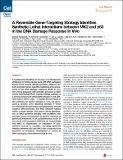A Reversible Gene-Targeting Strategy Identifies Synthetic Lethal Interactions between MK2 and p53 in the DNA Damage Response In Vivo
Author(s)
Reinhardt, H. Christian; Kim, Jacob S.; Ruf, Daniela M.; Mitra, Tanya; Couvillon, Anthony D.; Yaffe, Michael B.; Cannell, Ian Gordon; Reinhardt, H. Christian; Kim, Jacob S.; Ruf, Daniela M.; Morandell, Sandra M.; Jacks, Tyler E; Yaffe, Michael B; ... Show more Show less
DownloadMorandell-2013-A Reversible Gene-Ta.pdf (3.666Mb)
PUBLISHER_CC
Publisher with Creative Commons License
Creative Commons Attribution
Terms of use
Metadata
Show full item recordAbstract
A fundamental limitation in devising new therapeutic strategies for killing cancer cells with DNA damaging agents is the need to identify synthetic lethal interactions between tumor-specific mutations and components of the DNA damage response (DDR) in vivo. The stress-activated p38 mitogen-activated protein kinase (MAPK)/MAPKAP kinase-2 (MK2) pathway is a critical component of the DDR network in p53-deficient tumor cells in vitro. To explore the relevance of this pathway for cancer therapy in vivo, we developed a specific gene targeting strategy in which Cre-mediated recombination simultaneously creates isogenic MK2-proficient and MK2-deficient tumors within a single animal. This allows direct identification of MK2 synthetic lethality with mutations that promote tumor development or control response to genotoxic treatment. In an autochthonous model of non-small-cell lung cancer (NSCLC), we demonstrate that MK2 is responsible for resistance of p53-deficient tumors to cisplatin, indicating synthetic lethality between p53 and MK2 can successfully be exploited for enhanced sensitization of tumors to DNA-damaging chemotherapeutics in vivo.
Date issued
2013-11Department
Massachusetts Institute of Technology. Department of Biological Engineering; Massachusetts Institute of Technology. Department of Biology; Koch Institute for Integrative Cancer Research at MITJournal
Cell Reports
Publisher
Elsevier
Citation
Morandell, Sandra, H. Christian Reinhardt, Ian G. Cannell, Jacob S. Kim, Daniela M. Ruf, Tanya Mitra, Anthony D. Couvillon, Tyler Jacks, and Michael B. Yaffe. “A Reversible Gene-Targeting Strategy Identifies Synthetic Lethal Interactions Between MK2 and P53 in the DNA Damage Response In Vivo.” Cell Reports 5, no. 4 (November 2013): 868–877.
Version: Final published version
ISSN
22111247